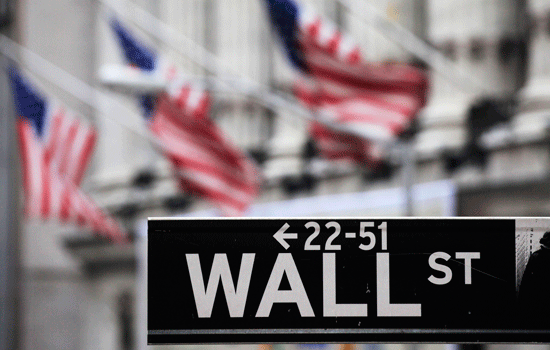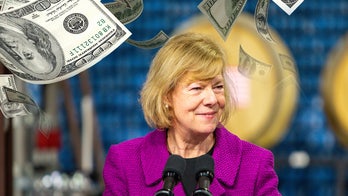
In this April 22, 2010 photo, a Wall Street sign is shown in front of the New York Stock Exchange. (AP)
The Democrats' proposed crackdown on Wall Street excess goes too far, critics say, arguing that the proposed new regulations would poison the well of innovation rather than protect ordinary Americans.
The new regulations Senate Democrats are proposing for the financial industry include setting up a mechanism for liquidating large firms and the creation of a consumer protection agency -- steps they say will prevent a future national financial collapse.
But James Gattuso, a senior research fellow in regulatory policy at the Heritage Foundation, said the legislation contains 14 fatal flaws that would hurt consumers and the economy and make another financial crisis or bailout even more likely to occur.
Among those flaws, Gattuso said, is the consumer protection agency, which he says would wreak havoc with the new rules and would lead to "lost innovation that was never offered."
"It's sort of like the dog that didn't bark," he said, explaining that if consumer rules were too strict 20 years ago, they may have prevented the creation of the debit card or impede Paypal.
He also said the regulations could restrict currently available products, such as a five-year adjustable rate mortgage that offers low payments for five years before a dramatic increase.
"It's good if you're going to sell your home in five years," he said. "I don't know what regulators think of that but I can see that being banned."
President Obama argues that the rules are needed to protect the little guy from the predators on Wall Street.
"I believe in a strong financial sector that helps people to raise capital and get loans and invest their savings is part of what has made America what it is, but a free market was never meant to be a free license to take whatever you can get, however you can get it," he told a Wall Street crowd Thursday in a speech at Cooper Union college in lower Manhattan. "That is what happened too often in the years leading up to the crisis."
The Consumer Financial Protection Agency would police lending, credit cards and other bank-customer transactions.
Karl Rove, a former senior adviser to President George W. Bush and a Fox News contributor, said he's not convinced there's a need for another government bureaucracy.
"If you got problems, solve the problems within the existing agencies," he said. "Let's not create a new bureaucracy."
Banking consultant Burt Ely said the bill potentially harms the economy by producing a "riskier financial system that is less efficient and more costly."
"I'm a big believer in the ironclad law of unintended consequences that [the provisions] could make the financial system riskier in ways that we can't even imagine," he told FoxNews.com.
Ely said there will be "a lot of hidden costs and hidden shaping in the marketplace." He also predicted the regulations could lead to more economic bubbles from products like subprime mortgages that sound too good to be true.
He compared the regulations to squeezing an inflated balloon, causing it to bulge in another place, and squeezing more until the balloon finally bursts.
But Democrats have portrayed the legislation as protecting taxpayers from the reckless behavior and practices of Wall Street. Obama has said the U.S. was destined to endure a new economic crisis that sticks taxpayers with the bill unless Congress tightens oversight of the financial industry.
Steve Verdier, director of congressional affairs at the Independent Community Bankers of America, said his association wants to the bill to pass but is seeking to lift some of the regulations on community banks.
"We don't think it makes a lot of sense," he said. "The provisions are designed to clamp down on big firms. Smaller banks don't need that sort of burden."
But Verdier said he supports the crackdown on nonbanks because they have been allowed to compete against community banks without the same supervision.
"The situation we have now, and one of the things that led us into the financial crisis were consumers were granted loans by companies that were not sufficiently regulated," he said citing payday lenders as one example.
"If you have the same regulation of nonbanks, there would not have been the abuse of consumers or the losses that the economy suffered," he said. "So you have to balance the cost of additional supervision with the cost of not supervising."




